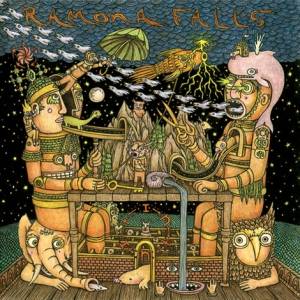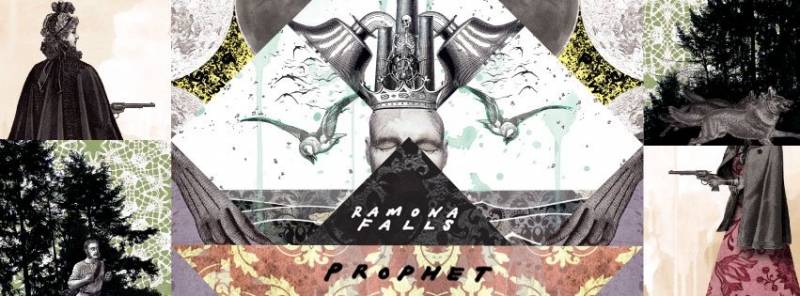When Brent Knopf left Menomena to focus on his band, Ramona Falls, many fans weren’t too worried. We, along with the critics, had loved his first album, Intuit. And speaking for myself, the best Menomena songs are those written and sung by Knopf anyway (I noticed his lack of influence on Mines, and missed it). Moreover, Menomena vowed to continue making music. Knopf’s departure seemed to us fans to be the best of both worlds. And his 2012 release, Prophet, proved us right.

 Brent Knopf is one of the most talented musicians of his generation. He’s creative, interesting, and willing to take risks. His education and interests go beyond coming up with the fastest, newest guitar or piano riff, and this is reflected in his lyrics and interviews. Intuit, a collaborative album overflowing with guest musicians (35 of Knopf’s friends), is, at times, epic in its intensity and orchestral arrangements (most especially in the songs “Melectric,” “I Say Fever,” and “Russia”). “Going Once, Going Twice” begins softly, intimately, and slowly builds to layered, intricate gorgeousness until it ends with an abruptness that leaves us puzzled and anticipating the following “Salt Sack,” a song with a completely different mood. And “Russia,” my favorite of the entire album, opens with melodic, simple guitar chords and Knopf’s quiet, emollient vocals — and suddenly, at 1:08, percussion that can only be described as inspired begins and continues for a minute and a half, causing the listener to experience the song’s longing and loneliness aurally, as well as intellectually once it ends.
Brent Knopf is one of the most talented musicians of his generation. He’s creative, interesting, and willing to take risks. His education and interests go beyond coming up with the fastest, newest guitar or piano riff, and this is reflected in his lyrics and interviews. Intuit, a collaborative album overflowing with guest musicians (35 of Knopf’s friends), is, at times, epic in its intensity and orchestral arrangements (most especially in the songs “Melectric,” “I Say Fever,” and “Russia”). “Going Once, Going Twice” begins softly, intimately, and slowly builds to layered, intricate gorgeousness until it ends with an abruptness that leaves us puzzled and anticipating the following “Salt Sack,” a song with a completely different mood. And “Russia,” my favorite of the entire album, opens with melodic, simple guitar chords and Knopf’s quiet, emollient vocals — and suddenly, at 1:08, percussion that can only be described as inspired begins and continues for a minute and a half, causing the listener to experience the song’s longing and loneliness aurally, as well as intellectually once it ends.

In his sophomore album Prophet, Knopf, along with bandmates Dave Lowensohn (bass), Paul Alcott (drums), and Brandon Laws (guitar), has created something of exquisite beauty — a lush, textured album with small details and moments of brilliance that will move and delight. Moments such as the piano chord in “Spore” at 1:10. It’s so light, so tiny. And yet, the song wouldn’t be the same without it.
The songs on Prophet reflect the album’s title: themes of searching for truth or guidance, trying to find the answers to questions, or to even understand the meaning of the questions themselves. I can’t put it better than the artist himself. Though the following quote is Knopf talking about “Archimedes Plutonium,” this description, to me, fits the entire album:
The difference between someone who goes to the threshold of human understanding and actually finds something true and [someone else] who goes there and finds nothing at all … there’s really not a lot of difference between those two personality types. (blip.tv)
Prophet matches its predecessor in poignancy and intensity, but this album rocks more (most especially with “Brevony”). You can’t tell where the next chord or rhythm is going to come from. Nothing is predictable. And while this album is, in Knopf’s words, “more of a band album” than Intuit, it still pushes boundaries musically, creatively, and instrumentally (last.fm). Prophet has been described as being “greater than the sum of its parts,” but I think that all of Knopf’s music, even going back to his time with Menomena, could be described this way. His work brings to mind a chemistry experiment in which numerous musical elements are tested and discarded, with the final product a perfect mixture of melody, lyric, and feeling.
OK, so enough about what I think of this band. When I learned that Ramona Falls would be performing in C-U as part of their Winter tour (they’ve been joined by violinist and vocalist Lauren Jacobson), I emailed Knopf some questions, and he wrote back some very cool and interesting answers (not surprising to those of us familiar with his interviews).
~~*~~
Smile Politely: You have a beautiful voice, but you seem to take a lot of care to keep it from becoming the main focus of your songs. Your singing style and voice blend exquisitely with your music, but (except for brief moments, such as the chorus in “I Say Fever”) nothing overshadows anything else. Is this just something that I’m hearing, or is this done purposely, by your own design?
Brent Knopf: Mixing one’s own voice into a song is one of the trickiest tasks there is because it’s so impossible to be objective. I wish I had a higher opinion of my own voice; maybe I’d mix it louder if I did. Some bands really highlight the persona of the vocalist. So far, I’ve tended towards viewing a song as an ecosystem where all the elements (including the voice) are looking for a place to live. So, I do my best fit them all together like a jigsaw puzzle.
SP: I read that you were a women’s studies major at Dartmouth. When did you study there? How would you describe your experience studying for this degree? Why this particular degree?
Knopf: I think Danny of Menomena was quoted as saying that I was a women’s studies major, but it’s actually not true. I took several women’s studies classes, however. My official major was “Theater modified with Music,” as I’d taken playwriting, drama theory, electro-acoustic composition, and acoustics courses. My final project was an abominable musical about an abusive psychiatrist, and the climactic scene parodied the Milgram experiment. When I was forced to declare a major, I chose the one I was closest to completing, but before then I took whatever courses I wanted to, like Animation, German, Education, Philosophy, Latino Studies, and Computer Programming.
SP: How has your education influenced your music?
Knopf: The Bregman Studio (a building primarily for faculty and grad-students to do Electro-Acoustic music) was where I really starting playing with computers and music. I took an independent study in Max/MSP and invented a program called “DLR” (pronounced “Deeler”) that Menomena and Ramona Falls later used as a tool when generating song ideas.
SP: What (or whom) would you say is a major influence for your art?
Knopf: The grit and grace of PJ Harvey, the fixation on urban planning in Talking Heads’ lyrics, the chords of Depeche Mode, the irrepressible production of Sly & the Family Stone, the gorgeousness of June Jordan’s laugh (Go to 1:45 – TN), the infinite libraries imagined by Jorge Luis Borges, and the aspirations of Buckminster Fuller.
SP: Under an Hour is one of my favorite instrumental albums. In my opinion, the song that you contributed, “Water,” is more similar to a classical composition than any other piece on the album. It’s the most complete of the three. Can you talk about composing this song? How you wanted it to sound? When you were writing it, was water your main focus, or were the dancers?
 Knopf: Recording “Water” for Under an Hour was my first foray into nomadic recording (setting up a laptop and a microphone as a guest in someone else’s space), an approach I later returned to for recording Ramona Falls’ debut album Intuit. I remember visiting my parents’ church and recording hand bells. I recall using deliberate foreshadowing of musical motifs, and that I refused to use a click-track on the eighteen-minute-long track. On the day of mastering, I finished mixing the song in the nick of time, and then suddenly burst into tears without warning, a really strange experience.
Knopf: Recording “Water” for Under an Hour was my first foray into nomadic recording (setting up a laptop and a microphone as a guest in someone else’s space), an approach I later returned to for recording Ramona Falls’ debut album Intuit. I remember visiting my parents’ church and recording hand bells. I recall using deliberate foreshadowing of musical motifs, and that I refused to use a click-track on the eighteen-minute-long track. On the day of mastering, I finished mixing the song in the nick of time, and then suddenly burst into tears without warning, a really strange experience.
The song glued together four major movements, and these four had been chosen by Tahni Holt (the choreographer) from a pool of … thirteen (?) demos, I think. Let me know if you’d like me to dig up the rejected demos, I think I have those lying around somewhere.
SP: Intuit’s “Boy Ant,” the only instrumental you’ve written since “Water” (that I know of) is lovely. Almost like a song meant for a ballet. Do you have plans to compose more instrumental songs for future albums?
Knopf: “Boy Ant” is meant to be a breath in the middle of the album. There’s also instrumental pieces at the end of both Menomena’s Friend and Foe [beg. at 4:30 of “West” – TN] and Mines [beg. at 5:00 of “INTIL” – TN]. Yeah, I actually think I’d like future albums to include an instrumental here and there. I had considered one for Prophet, but never got around to recording it.
SP: “Sqworm” is one of my favorite songs from Prophet, but I confess that I don’t understand it. It seems that someone is hiding from something dangerous: “I put the lamb’s blood on my door.” What does the title of the song mean? It seems to be a combination of “squirm” and “worm.”
Knopf: It’s anyone’s guess, but yours is spot-on. An uneasiness with one’s repressed/subterranean animal nature. In an interview for self-titled magazine, I wrote this about “Sqworm”:
Most of us present a facade of reasonability. We don’t talk too much about the irrational impulses, because we want to prune these away. Okay. So, you’re a grown up. You’ve learned to suppress (or at least hide) your urges. Do you hear the beacon? The signal? The signal telling you to quit your job? The morse code suggesting you ask her out on a date? The distress call demanding you jump out of the car and smash in the face of that tailgating jerk? Okay. So, you do a good job discerning which of these signals to tune out, which to amplify. You’re responsible, after all. And you put all of your energy and love behind an endeavor. (A marriage? A job? A band? A charity?) And it fails. Spectacularly. The love you thought was unconditional is gone. That whole “forever”/“unconditional” thing was a lie. Now, quick. Gather your things, and redirect your affection/energy and try to believe it’s going to be different this time. Go through the motions. Fake it until you make it.
SP: Which are your favorite songs from Intuit and Prophet? Can you also explain why?
Knopf: I have favorite sections. The guitar solo at the end of “Fingerhold” on Prophet. The drum-beat in “I Say Fever” on Intuit. The synth-bass / drums rock-out at 3:50 in “Spore” on Prophet. The choral singing in “Bellyfulla” on Intuit. These sections work on an emotional level for me, in a musical way that I didn’t (and still can never) predict. They work and I don’t know why they work.
SP: Thank you for the video for “Fingerhold.” It’s beautiful. Was the subject matter your idea, or does all the credit go to Thom Glunt?
Knopf: I was a consultant on the story-line, but the general concept and the lion’s share of credit goes to Thom. He had few resources to work with and made something beautiful. I wish more people would check out that video, it affects me emotionally every time I watch it.
SP: Speaking of credit. We’ve all heard the story of Danny Seim laboriously assembling the cover for I Am the Fun Blame Monster!, but I’m not sure that many know that the original origami design was created by you. Did you also design Prophet‘s packaging?
Knopf: The concept and design of the flipbooks that housed Menomena’s debut CD was a team effort, but Danny hand-assembled the vast majority of the first batch. Yeah, I designed the origami monster that houses the same album on vinyl, and it was a small (and expensive) pressing. The CD-packaging of Prophet was designed by (my best friend) Nicholas Mahon and myself, with Nicholas generating the imagery, and me obsessing about the kinetic mechanisms and paper-structures. By the way, the artwork for Menomena’s Friend and Foe was also a team-effort [graphic artist Craig Thompson]. I really love collaborating with ingenious people to create whimsical and unexpected objects.
~~*~~
Ramona Falls performs this Saturday, January 26 at Mike ‘N Molly’s for Smile Politely’s Show Series. Opening for the band is our own Mille Nomi. The show starts at 8:00 p.m. and tickets are $10.
All photos from Ramona Falls’ Facebook page.








